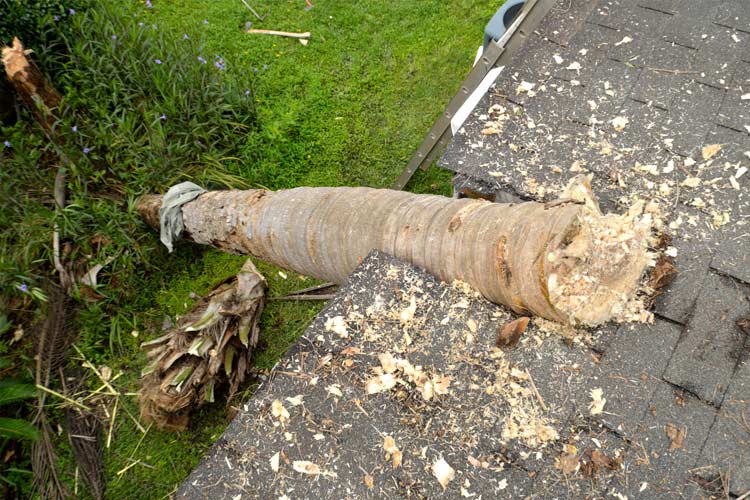
The worst kinds of damage to your home are often caused by things you have no control over, including your neighbor’s yard. Storms or just plain negligence can lead to trees smashing your roof and windows. So if a neighbor’s tree does fall on your home, what then? Who’s responsible for this mess, anyway?
Fortunately a Florida independent insurance agent can not only answer this question for you, but also help you get set up with the right homeowners insurance. They’ll get you covered before you ever have to file a claim for fallen trees or anything else. Until then, here’s a breakdown of who’d be responsible in this situation.
Whose Tree Is It, Anyway?
Knowing who a tree actually belongs to is an important step before any insurance claims get filed. Legally speaking, the owner of the land on which the trunk of the tree rests is the owner of the entire tree. It doesn’t matter if the tree’s branches or canopy extend over a neighbor’s home.
So, if a fallen tree’s trunk lives on your neighbor’s property line, that makes it their tree. Make sure to note exactly which plants fall on which property line long before an incident ever happens to streamline the claims process in the future.
Who’s Responsible for Fallen Tree Damage?
Some trees fall through no fault of anyone. Storms, wind, and other natural causes are considered “acts of God” by insurance companies, and therefore no human can be held at fault for a collapse. However, insurance expert Paul Martin said that if your neighbor can be proven to have been negligent, they will be held responsible for any damage.
Negligence can be defined as someone ignoring a dead or rotting tree on their property for years. If a plant on your property could be a potential hazard down the road, it’s your responsibility as a homeowner to get it removed. Each fallen tree situation is unique, so the specific details will have to be evaluated to determine who’s really responsible.
Will My Homeowners Insurance Cover Costs If I’m Found Liable?
Say it was actually your tree that fell onto your neighbor’s house. If they could prove you were negligent or otherwise responsible, such as if you were cutting down a branch by yourself and it fell onto their home, they could sue you. But your Florida homeowners insurance does come with built-in liability coverage to protect you.
If your neighbor pressed charges against you, your homeowners insurance’s liability coverage would pay for costs for an attorney, and any court fees. It often also covers settlement fees if you’re found guilty. A Florida independent insurance agent can help you review the liability coverage section of your homeowners insurance policy.
Is Damaged Landscaping also Covered by Homeowners Insurance?
Whether damaged landscaping will be covered by homeowners insurance depends, of course, on the situation. Storms and other causes for damaged landscaping are often covered. But you failing to maintain your garden or hedges is not.
There are still “acts of God” or acts of negligence by others that could damage your landscaping, for which you would not be responsible. If a drunk driver plowed through your yard and destroyed your landscaping, your home insurance would likely cover that. It all just depends on the cause.
How Much Does a Fallen Tree Claim Cost?
There are a few factors that influence the cost of a fallen tree claim, such as the amount of property damage done by the fall. Often, a standard homeowners insurance policy comes with coverage of $500 to $1,000 for removal of a fallen tree. Sometimes that’s not enough, though.
Fallen tree removal can cost up to $2,000 or even more, and that’s before factoring in any damage to your house. Fortunately your homeowners insurance is likely to cover property damage to your home’s structure or contents inside caused by a fallen tree. A Florida independent insurance agent can explain further.
Can You Prevent Falling Trees?
There are steps you can proactively take to prevent trees from falling, and possible resulting property damage and insurance claims. Start taking these action steps today to prevent future incidents.
- Note any fungi or pests: Fungi and insects or other pests can cause a tree to die and become a hazard. Regularly monitor your trees for signs of fungi and pests, and be sure to start taking any necessary measures to correct problems as they arise.
- Monitor your trees’ health: Regularly inspect your trees all around, looking at their trunks, branches, roots, and leaves. If you spot any dead or decaying parts, that’s a bad sign. The tree may be diseased and in need of removal.
- Say goodbye to dead plants: If a tree is diseased past the point of recovery or already dead, it’s critical to get it removed ASAP. Though you may not want to lose the plant, it could save you a major headache down the line.
No one wants to end up with a fallen tree on their home. Luckily taking these proactive measures can ensure that doesn’t happen.
Here’s How a Florida Independent Insurance Agent Would Help
Florida independent insurance agents are fully equipped to protect homeowners against commonly faced liabilities. Independent insurance agents shop multiple carriers to find providers who specialize in homeowners insurance.
They can deliver quotes from a number of different sources and help you walk through them all to find the best blend of coverage and cost.
Author | Chris Lacagnina
Article Reviewed by | Jeff Green